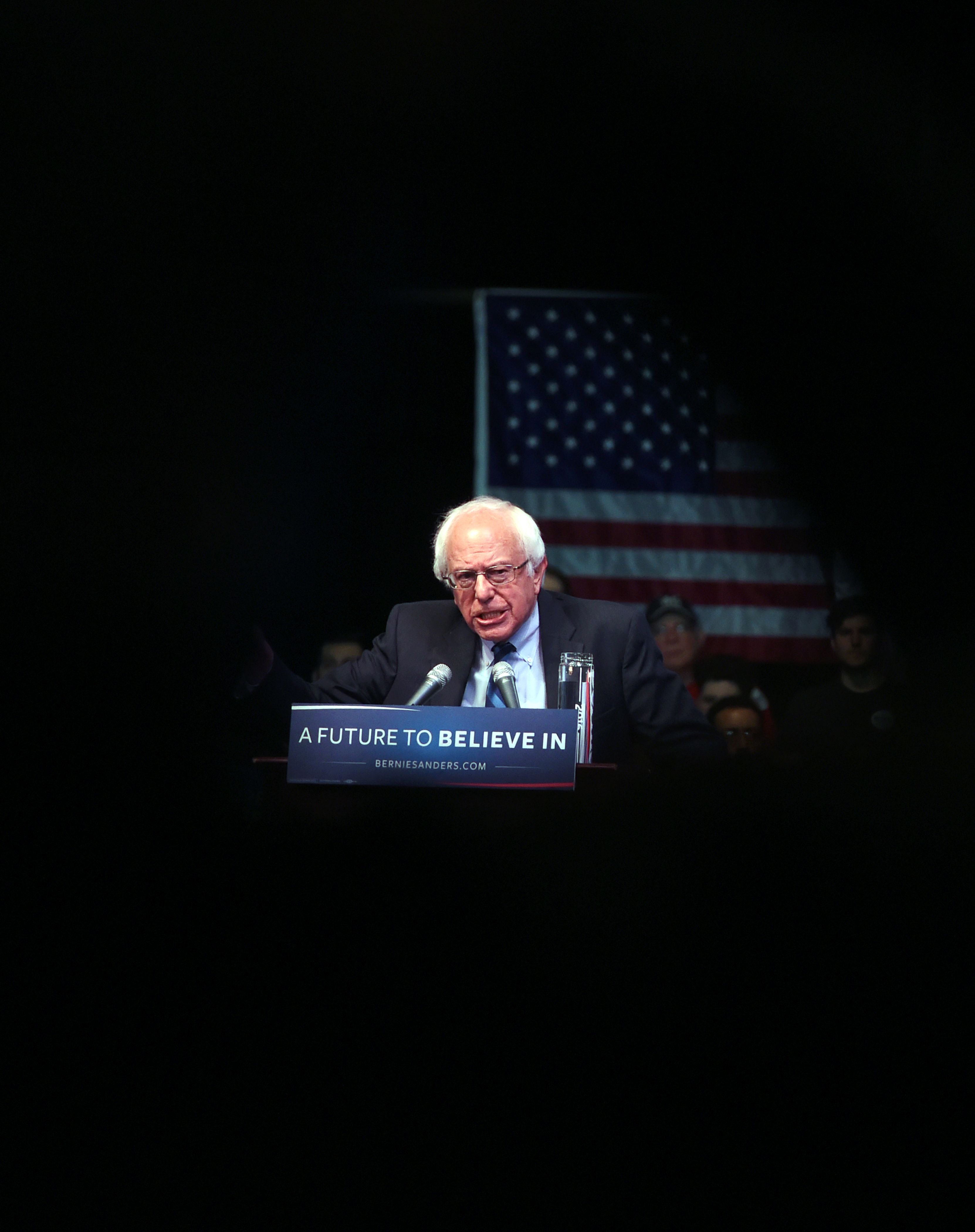Bernie Sanders' campaign isn't about ideas anymore. It's about him.
This endangers his legacy — and he needs to realize it


Bernie Sanders made a huge mistake this week. It's one that, if not soon corrected, could squander the sizeable influence he has over his party's platform, and, more indelibly, create for the eventual Democratic nominee, former Secretary of State Hillary Clinton, a schism in the party that she does not have the means to reconcile.
The error: Bernie's campaign became a vehicle to advance Bernie Sanders' vainglory and cult of personality. His staff responded irresponsibly to violence at the state caucuses in Nevada. He compounded their tone deaf responses by wrapping a muted condemnation of the chaos inside a long justification of the complaints that caused it.
Clinton won Nevada by six points on Feb. 20. The rules for delegate selection are clear. They are complex but they are not opaque. Sanders knew them going in to the race, and by accepting delegates, he has signed on to their legitimacy. He can protest them and try to revise them, but he cannot, in good conscience, urge his supporters to ignore them — or to find them unfair, inter alia, as the stakes change.
The Week
Escape your echo chamber. Get the facts behind the news, plus analysis from multiple perspectives.

Sign up for The Week's Free Newsletters
From our morning news briefing to a weekly Good News Newsletter, get the best of The Week delivered directly to your inbox.
From our morning news briefing to a weekly Good News Newsletter, get the best of The Week delivered directly to your inbox.
But before you accuse me of not understanding what really was at stake, let me explain for you the reason why Sanders's supporters got so angry.
The rules say that the chairperson of the state convention can call for a voice vote to approve the adoption of the credentials report — basically a list of delegate identities submitted by each campaign. The chairperson of the Nevada State Convention, Roberta Lange, did just that. The room erupted. Sanders's supporters were angry that the credentials report had enshrined the selection of many more Clinton supporters than Sanders supporters, and they loudly tried to "no" vote the approval process. Lange reasoned — reasonably — that the volume of the nays did not reflect the size of the nay vote. (Indeed, there were more Clinton supporters in the room.) Only Lange can decide whether to call for a roll call vote, or some other mechanism. Those are the rules. Even as Sanders supporters screamed at her, spitting cusses in her direction, she decided not to. That's her prerogative. Those are the rules.
A responsible answer to this chaos from the Sanders campaign would have been to say: "We think the rules are unfair and did not give voice to our supporters, and we will try to revise the rules to make sure that this doesn't happen again."
That is not the answer that Sanders's campaign gave. Instead, they (once again) questioned the legitimacy of the party. Questioning the legitimacy of the institution that you've chosen to work inside of is tantamount to a call for a revolt. If the DNC and its proxies are not legitimate, then, indeed, the election IS being stolen from Bernie Sanders, and since a hell of a lot IS at stake, then agitation verging on violence is pretty much the only alternative short of going home and giving up.
A free daily email with the biggest news stories of the day – and the best features from TheWeek.com
It's fine for Sanders supporters in the heat of battle to believe this, but it is beyond irresponsible for Sanders's campaign to encourage the provenance of this view. Why? Because it's not true. It simply isn't. The rules are not rigged in favor of or against any particular candidate. They can't be. They were set long before the candidates entered the race. They haven't been capriciously changed. Indeed, they are skewed in FAVOR of Sanders: He has received more delegates than his popular vote totals should see him allocated, assuming that, as he does, the only real form of democracy is direct. Or maybe not: He has repeatedly said that the party does a disservice when it doesn't allow independents to vote in its primaries. And he has also said that he represents the "working people" — the "working people" only vote for him. (Do Clinton supporters not work?)
His campaign is descending into semiotic babble. He is creating unrealistic expectations for his supporters. If those expectations cannot be met by a reconciliation, and if the party truly cannot convince a large number of Sanders delegates that they have been treated fairly, then his delegates could cause real trouble at the convention. They could prevent Clinton from uniting the party. They could prevent Sanders from keeping the party accountable for its promises to voters. They could nullify the very real power Sanders has right now to remold the party in the image of the type of candidate who is independent and more attentive to working class voters.
In other words, his blinders, put upon him by campaign staff and other hangers-on, are hurting his cause right now. I've vacillated about whether a responsible Democrat should want Sanders to stay in the race, given that his chances of winning the nomination by accumulating delegates are vanishingly small, and that his arguments that superdelegates should follow the expressed will of their state's voters have fallen largely on the back of necks — ears have turned away. For me, it came to down to the future of the party. If Sanders's movement was best served by his presence in the race, he should stay in. If not, he should bow out. For a while, his victories in demographically appropriate states, his willingness to tone down his attacks against Clinton, his musings about building the party's bench down the ballot — all of these pointed to a man with mature instincts for a tempered use of his considerable power.
Even his supporters know: Bernie's campaign isn't about them. It's about policies. It's about removing the influence of big money in politics. It's about fairer trade. It's about an American manufacturing renaissance. It's about, in other words, stuff for other people. The moment it becomes about him is the moment he needs to make it about that other stuff again. Time is running out.
Marc Ambinder is TheWeek.com's editor-at-large. He is the author, with D.B. Grady, of The Command and Deep State: Inside the Government Secrecy Industry. Marc is also a contributing editor for The Atlantic and GQ. Formerly, he served as White House correspondent for National Journal, chief political consultant for CBS News, and politics editor at The Atlantic. Marc is a 2001 graduate of Harvard. He is married to Michael Park, a corporate strategy consultant, and lives in Los Angeles.
-
 Norway’s scandal-hit royals
Norway’s scandal-hit royalsIn the Spotlight Rape trial of Marius Borg Høiby, son of the crown princess, adds to royal family's ‘already considerable woes’
-
 The Beckhams: the feud dividing Britain
The Beckhams: the feud dividing BritainIn the Spotlight ‘Civil war’ between the Beckhams and their estranged son ‘resonates’ with families across the country
-
 Quiz of The Week: 24 – 30 January
Quiz of The Week: 24 – 30 JanuaryQuiz Have you been paying attention to The Week’s news?
-
 The billionaires’ wealth tax: a catastrophe for California?
The billionaires’ wealth tax: a catastrophe for California?Talking Point Peter Thiel and Larry Page preparing to change state residency
-
 Bari Weiss’ ‘60 Minutes’ scandal is about more than one report
Bari Weiss’ ‘60 Minutes’ scandal is about more than one reportIN THE SPOTLIGHT By blocking an approved segment on a controversial prison holding US deportees in El Salvador, the editor-in-chief of CBS News has become the main story
-
 Has Zohran Mamdani shown the Democrats how to win again?
Has Zohran Mamdani shown the Democrats how to win again?Today’s Big Question New York City mayoral election touted as victory for left-wing populists but moderate centrist wins elsewhere present more complex path for Democratic Party
-
 Millions turn out for anti-Trump ‘No Kings’ rallies
Millions turn out for anti-Trump ‘No Kings’ ralliesSpeed Read An estimated 7 million people participated, 2 million more than at the first ‘No Kings’ protest in June
-
 Ghislaine Maxwell: angling for a Trump pardon
Ghislaine Maxwell: angling for a Trump pardonTalking Point Convicted sex trafficker's testimony could shed new light on president's links to Jeffrey Epstein
-
 The last words and final moments of 40 presidents
The last words and final moments of 40 presidentsThe Explainer Some are eloquent quotes worthy of the holders of the highest office in the nation, and others... aren't
-
 The JFK files: the truth at last?
The JFK files: the truth at last?In The Spotlight More than 64,000 previously classified documents relating the 1963 assassination of John F. Kennedy have been released by the Trump administration
-
 'Seriously, not literally': how should the world take Donald Trump?
'Seriously, not literally': how should the world take Donald Trump?Today's big question White House rhetoric and reality look likely to become increasingly blurred
